Written by John Edward Betancourt 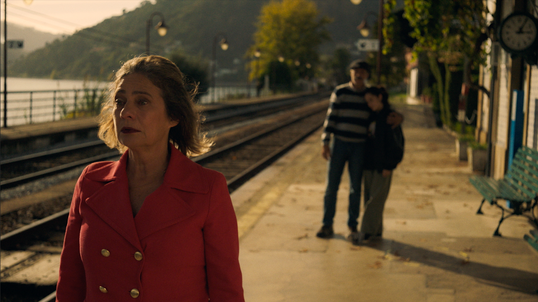 The Family Dynamic Changes in Antonio Sequeira’s AUTUMN. The Family Dynamic Changes in Antonio Sequeira’s AUTUMN. The day that each and every one of us leave home for college, or to set out into the world, is supposed to be quite the special day and understandably so. After all, this day is the culmination of eighteen years of growth and learning and hard work from all parties. And that is why we cherish this day and celebrate it and see it as nothing but purely positive. But if there one constant truth that accompanies days we cherish, it is that they are not exactly what we expect them to be in our mind, and this event is no exception to that rule. After all, there’s no cinematic feel to this day. There’s the usual chaos that accompanies traveling, and this is a moment of great change in everyone’s life and sadly… we don’t talk about this. Or the impact it could have upon people. But thankfully, this new era of storytelling is working to change that. For day in and day out, there are creatives eager to accurately document the human experience in print, or on television or in film and it just so happens… that a film from writer/director Antonio Sequeira, that recently screened at the Austin Film Festival, takes the time to explore what the reality of that moment in our lives actually looks like, and the lasting impact of having the family unit go its own path for all the right reasons. A feat that Autumn accomplishes by introducing us to a Portuguese family that is dealing with that all-important day. For the eldest son is headed to college and while there is indeed pomp and circumstance over him leaving home to learn and grow… what follows his exit, is nothing short of chaos. For everything changes for the family, and those changes are reflected when he comes home to visit during breaks at university. Which gives rise to a powerful story, one that truly chronicles how that moment impacts so much. Such as how leaving home changes our perspective on so much in life. Since we learn about the world as it really is when we get out there, and that changes our worldview and makes us question some of the lessons we learned growing up. Not to mention, this young man’s experiences also remind us of the fact that when we leave home, we are indeed on our own. Where it is up to us to use what we have learned to create stability and income and peace, and that gives us a real taste of how tough adulthood will be down the line, and it also gives us a sense of appreciation and melancholy for what we’ve lost, and that’s all covered here in a magnificent manner that is relatable and impactful. 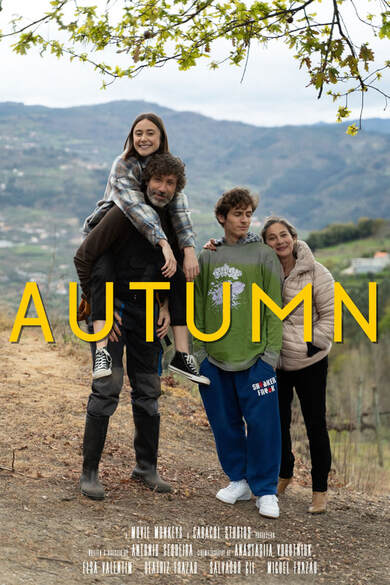 Plus, the movie makes sure to cover what parents go through as well. Such as grief. Because just like that… there is no more caring for their little one, and a familiar routine that’s been part of their days for eighteen years is gone. And that can create real struggles at home, as they work to adjust and of course… that also amplifies for parents, their age, and where they are at in life. Because that’s a huge chapter closed and it definitely prompts one to look at the road ahead and well… those two key elements, create a very visceral feature. One that feels painfully real often. Simply because, we are privy to moments that we have either lived through or will live through and well… in the end, all of those elements make for a brilliant motion picture. Simply because, it is rare, even in this incredible age of film, for a movie to try and just capture the moment as it stands. For the belief is always that dramatic effect takes precedence or that a story or some kind of narrative has to be tied to these events to make them more palatable. But here, we are simply witnessing a year in the life… of people. In fact, setting the movie in Portugal only adds to the wonder of this motion picture. For that serves as a fine reminder that these kinds of moments, are universal and human, and are not exclusive to a particular culture. But what truly makes this motion picture worth our while… are the core messages that all of these important moments/memories are designed to send our way. In that, while this day may not be as magical as we would like for it to be, it is still a critical moment in our lives. For this is when one chapter ends and another begins, and we get the opportunity in every sense of the word… to write a new one as we see fit. Because once the mourning is done, and once the change is adjusted to… we go on. For the kids forge a path in the world and find their place within it and carry with them eighteen wondrous years of memories and connection that can never be lost or severed, and the parents go on… and live. Live with the knowledge they’ve done something special, something wonderful, and they can now rest and catch up on a few goals they hadn’t before, and hopefully in the end, the powerful lessons present here and the poignant moments as well, will make this a foundational film for years to come for families on the brink of the next chapter of their lives.
0 Comments
Written by John Edward Betancourt 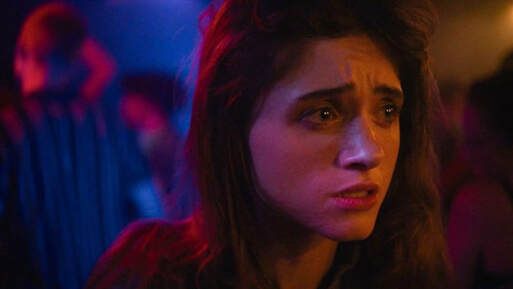 Natalia Dyer as Annie in Jac Cron’s CHESTNUT. Natalia Dyer as Annie in Jac Cron’s CHESTNUT. We truly believe when we set out into the world, that love will make our lives complete. Because we’ve seen what it did for our parents and the strength it gave them, and we enjoy tastes of that as well along the way. Through butterflies that flutter strongly in our stomach when we see that person that means the world to us, and we shiver from the stunning electricity their kiss sends down our spine, and the soaring feeling they give us as well, makes it clear that their love will indeed help us to achieve wonders. That is… until we come to learn that love doesn’t really do any of that for us, a fact we come to learn through rough relationships and heartbreak. Which of course, puts us in a tough place. Where we aren’t sure if we can trust or love ever again. Because that’s how much value we put upon the power of love and what it means for us. But while that seems like the end of the world in that moment, devastating heartbreak and the reality that love sometimes can be fleeting in this world… actually is more helpful for us than we know. Because it gives us time to feel raw emotions, we didn’t know we were capable of feeling, and reflecting upon what went wrong can help us to understand what we really need out of love, and it can also motivate us to work on ourselves and try to be better if we discover that love exposed a few flaws within ourselves we need to fix. If anything, that learning experience that love sends our way is top of mind today, simply because it was recently featured in a movie that screened at the Austin Film Festival. A feat that Chestnut accomplishes by introducing us to a woman named Annie who has just graduated college and well, she isn’t sure the path she plans to walk is the one for her. But thankfully, there’s time to think and time to prepare for the next chapter ahead and while Annie is out pondering upon what comes next and if it is right for her, she runs into a couple named Danny and Tyler, who… express romantic interest in her, especially Tyler. Which sends Annie’s heart soaring. For Tyler is a gorgeous and dynamic woman that knows how to make Annie feel alive. Not to mention, Danny is her type for certain and charms her in a manner she’s never been charmed before and what follows… is a sordid… yet hollow love affair. One where Annie opens her heart to both people and receives nothing in return, leaving her to wonder… what it will take to claim their love. 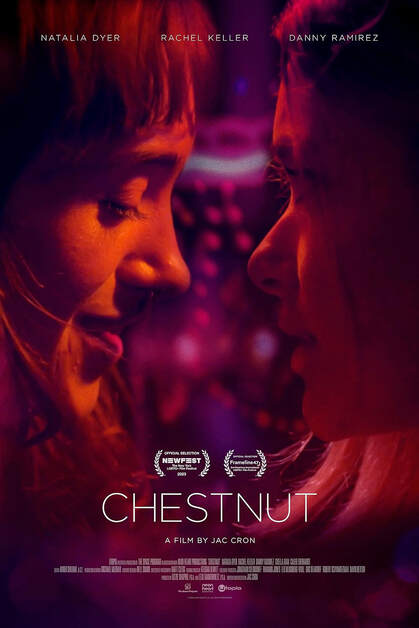 Which is the perfect way to explore how heartbreak and romantic struggles can teach us so much about ourselves. Because despite Annie’s best efforts to be near either Danny or Tyler, she cannot crack the code to get into their hearts. She merely feels the wonder of her love for them and their reserved love for her fluttering about her head, and that prompts her to think about staying in Philadelphia and abandoning the life she’s ready to lead. All because… she truly believes that love will guide her in ways she never thought possible. For the storybook romance and chance encounter is what we all dream of. But alas… this movie deserves a round of applause for showcasing how easily we fall into that trap of silliness and what comes after when we wake up from the dream that kind of lover presents us with. Since we are indeed privy to Annie’s long and winding journey to learn what it means to really love another person and how there must be give and take, and this movie also takes the time to explore… how we come to learn the importance of loving oneself, first. For we cannot give anything to anyone without being happy with who we are, and that journey is where this story truly shines. In part because so few films present that with such raw and dynamic honesty. But it is here, and it is powerful, and it helps those in Annie’s situation, and those that went through such a scenario, get a powerful reminder of how wonderful it was to learn about themselves… and the wonder of who they really are. Giving rise to a very human story that is supremely real and truly reflects the romantic dynamics in modern America. Thanks in large part to the fact that it features an LGBTQIA+ main character whose precise preference isn’t defined in this feature. Which serves as a perfect reminder that is love is love, and that there are indeed people out there exploring romantic possibilities with all genders. Because like Annie… they want to truly be happy, and that kind of honesty with oneself brings that about, and this story deserve an even louder round of applause for presenting romance and dating in such a realistic light, and it also doesn’t hurt… that all of these amazing moments are brought to life by amazing acting. For Natalia Dyer is simply stunning here as Annie and commands the screen with incredible vulnerability and honesty and, she is wonderfully contrasted by Rachel Keller (Tyler) and Danny Ramirez’s (Danny) tortured and frustrated performances, and all of these elements combine to bring forth a poignant and important feature. One that truly reflects a critical time in our lives, and some important lessons we all need to learn in order to find the true love we seek. Written by John Edward Betancourt 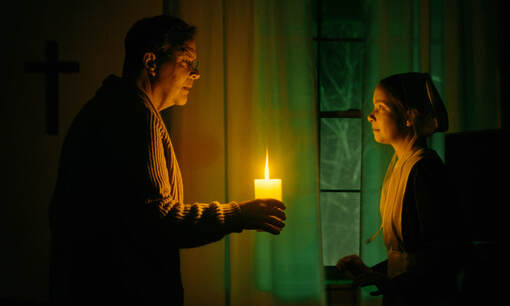 Sean O’Bryan and Rebekah Kennedy as Douglas and Hannah in Cameron Beyl’s THE VEIL. Sean O’Bryan and Rebekah Kennedy as Douglas and Hannah in Cameron Beyl’s THE VEIL. Caution: This article contains spoilers for the motion picture, ‘The Veil’. One hard truth about life that no one ever wants to face and/or learn… is that we are going to make a lot of mistakes. And we want to steer clear of that truth, simply because, we are taught… pretty much from the moment we can comprehend… that perfection is what is expected of us. We must be flawless in everything we do, and every decision should be the right one, and we should approach every choice with foresight and calm and well… it simply doesn’t work that way in life, and mistakes will flow. Some will be small, some will be large, but they will happen none the less, and we will also… ponder deeply upon every single one. To the point where the little ones might keep us up at night, and where the big ones… will haunt us. In fact, some of the biggest mistakes we will ever make will unsettle us and bother us so deeply, that now and again we will hope and pray for a second chance regarding them. Just to have that peace. But alas, the odds of that ever happening are slim to none. For life is a one-shot affair and second chances are as rare as they come, and… there are no guarantees the second chance would go the way we want it to. But of course, there’s no real way to know. But that doesn’t mean there aren’t ways to explore what could happen, through storytelling no less. And it just so happens that a brand-new sci-if/horror flick from writer/director Cameron Beyl, that recently screened at the Austin Film Festival, ponders upon what a second chance for a big mistake in our lives, might actually look like if by chance we were granted one, and that makes The Veil quite the fascinating watch. Simply because this story grants a man a second chance for one incredible mistake. For back in 1977, Douglas, a man of the cloth, let fear into his heart one night when a woman found him on the side of the road during an Aurora Borealis storm and begged for his help… only for him to deny her that help. And while Douglas enjoyed an amazing career as a priest and saved lives and helped so many… he regrets that night deeply, especially during the early days of his retirement. For that woman was clearly in trouble on that night and he should have helped and would give anything to go back and fix that and well… another Aurora Borealis storm will grant him his wish. For on the night of this storm, a woman named Hannah appears at his doorstep and she just so happens to be the very woman he denied help to all those years ago. But this time around, he could genuinely help her, provided of course… he doesn’t terrify Hannah into defending herself, courtesy of his incredible eagerness to save her life. 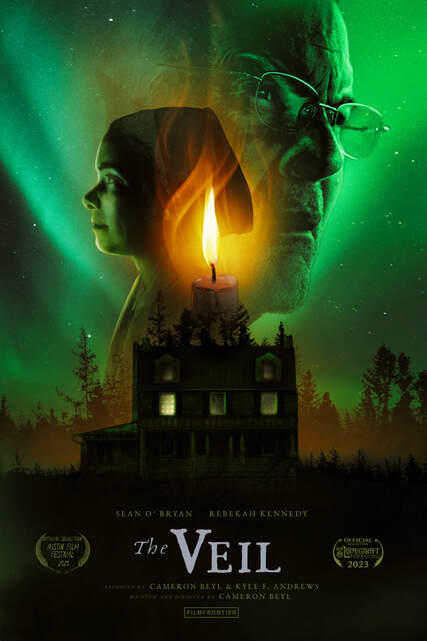 Which is… the perfect way to explore what a second chance looks like. Because Douglas is indeed granted it in the most epic way imaginable. By standing before the very person, he denied help to, at a moment she is desperately in need. And well, this story informs us… that a second chance may not indeed go the way we expect it to. In large part because… when one spends years pondering deeply upon a grand mistake, one might be filled with nerves and worry, and outright desperation to get things right, and that could lead to awkward moments. Making it clear that, what we have to do when it comes to the mistakes, we’ve made… is accept them, embrace them and learn from them. So that we don’t make them ever again, and of course… this movie also informs us… to follow our gut and take chances now and again… since that will also help to mitigate regret and a need to wish for a second chance. Yet while those points make this motion picture worth our while since those are some powerful lessons to send our way, this story also offers so much more for the audience. After all, there was mention that there are elements of horror to be found here and those are simply amazing to say the least. For much of the movie takes place in the faded light of the colorful skies, and until the central theme presents itself to us, we are clueless as to what is going on. Which leads to some uncomfortable worry, and unnerving moments as Douglas works to figure out what is happening on this strange night Not to mention, there’s a delightful gothic feel to this feature, giving it a hardcore 1970s vibe despite being set mostly in present day. All of which engages the viewer and demands their attention as they work to discover the truth about what is happening on this weird and colorful night. But of course, a plot this complex and scares that deeply psychological, don’t work in the slightest without quality acting and thankfully you’ll find that here as well. Since Sean O’Bryan, who plays Douglas, sells the regret of that dark day, and Douglas’ desperation to grab that second chance… with a gravity that feels a little too real at times, and he is wonderfully counterbalanced by Rebekah Kennedy, who plays Hannah. For she does an incredible job of selling the fear and the confusion in this story in a manner that is also believable and moving, thanks to some very real-world elements to her plight, and well, all of these elements combine to bring forth a fascinating sci-fi/horror film. One that toys more with the horrors of the mind really and one that truly reminds us to live in the moment and always make the best choice we can. Written by John Edward Betancourt 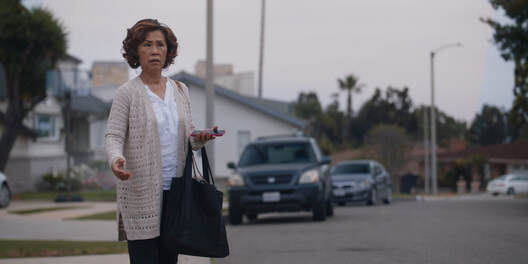 Angie Rhee as June in David Au’s DON’T BE SORRY. Angie Rhee as June in David Au’s DON’T BE SORRY. Caution: This article contains spoilers for the Short Feature Film, ‘Don’t Be Sorry’. One unfortunate truth about each and every one of us, is that we when we are angry or afraid or both… we tend to say and do vicious things. All because that fear and that anger boils over and somehow that primal jelly in the center of our brains prompts us to believe that lashing out will make us feel better, feel catharsis and safety, when in fact… it does nothing but damage. For those physical acts create genuine wounds that need to heal, and our words create different kinds of wounds that require a different kind of healing and what’s worse… is that sometimes we impart this kind of pain upon strangers and don’t think twice about it. Because we don’t have the face the consequences of what we’ve done. At least, not right away, but that’s a discussion for another time. Because what matters more is that in that moment, is that the person we just snapped at or struck at, out of some foolhardy fear, is forever changed. They’re now filled with their own fear and anger, and those aforementioned wounds, all because we desperately wanted peace in that moment and truth be told, we didn’t find it. But now, they are headed down a unique and powerful path. Where they have to decide what to do with their own conflicted and broken emotions over what the just experienced. And it just so happens that the time has come for us, to understand what kind of impact these actions have, courtesy of a stunning short feature film from writer/director David Au, that recently screened at the Austin Film Festival in Don’t Be Sorry. A film that introduces us to June. An Asian-American woman that is going through a shockingly difficult time in her life. For despite being an American citizen and living in suburbia with her beloved husband, George, horrible violence found their way into their lives. Through a hateful and racist attack upon her husband, one so awful it put him in the hospital. A moment that has indeed and rightfully left June beside herself and afraid, as she works to process the reality that racism found her family in such a manner and well… there’s little she can do reconcile it. She can only endure the power of fear, and the pain she carries and the anger that it all creates. For this was not supposed to happen to her, or her husband, not in the land of the free. But she does find some catharsis in slapping videos online, the kind that inform her… perhaps turnabout is fair play to the next person that opts to disrespect her. 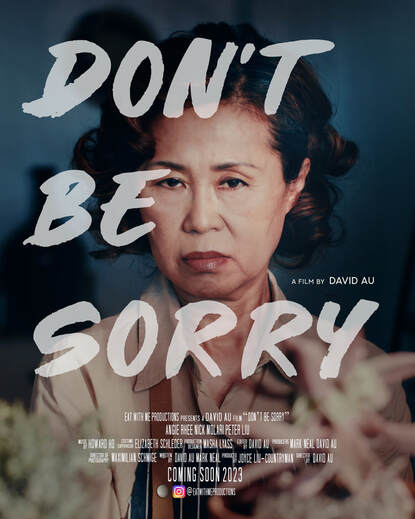 Which brings about, one powerful story. One that truly does explore in haunting silence, the impact of people’s negative actions upon the innocent in perhaps one of the most timely and relatable ways imaginable. Since it wasn’t that long ago, that Asian-Americans were targeted in a horrific manner out of the stupid belief that somehow people of Asian descent in America, had something to do with the spread of a virus. Because of fear, because of anger and because those elements brought out the worst in people and brought them temporary catharsis by imparting harm on others. And by plunging us into the unfortunate zeitgeist of the past few years, we are deeply drawn into this story and vulnerable and open to June’s plight… one that outright breaks your heart. Because just like that… we feel her fear, we feel her worry and confusion, and that is undoubtedly what the Asian-American community felt in that moment, and what others feel now for other reasons. Which is not to detract from those experiences, but it is important to recognize this is ongoing, and that people in similar situations are home right now, shivering in fear, feeling vulnerable and afraid and unsure of what horrors await them and who will be next to fire off a slur or outright harm them. Which is why it should come as no surprise that June embraces the violence imparted upon her and is happy to unleash it upon the one asshat that pushes her too far, without remorse or sorrow. Because she too, needs that catharsis, that sense of safety that she can defend what’s hers. Giving rise to a tragic ending really, one that speaks to the reality, stupidity is creating cycles of violence. Which makes this… a powerhouse feature. One that makes it clear, we need to do something different. We need to stop giving into fear, and find new ways to deal with it and find new ways to process the horrors of the world, so others don’t have to commit to the cycle of violence, the cycle of dumb that humanity takes part in. But all lessons aside, what also makes this so powerful a feature, is that it really does showcase, the fallout of those news reports we only hear about and puts a human face upon a very real human experience, a negative one for certain, but an experience one the less. Which is why people do need to seek this film out and see it, to understand how the other half lives and to finally learn… that we have to be better, because we’re all the same in the end and we’re all in this together. Written by John Edward Betancourt 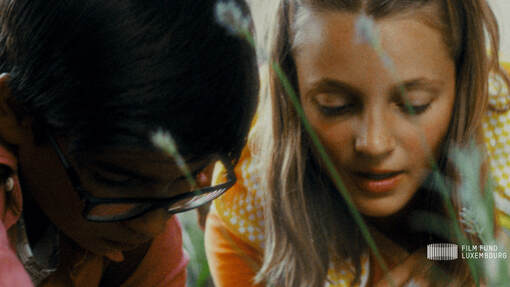 Caution: This article contains spoilers for the Short Feature Film, ‘Arman & Elisa’. We live at a point in human history, where we are desperate to enact change when it comes to the darkness that surrounds us. Simply because there is an understanding that said darkness is destructive and it inspires the wrong acts in the wrong people, and we know that without doing something soon… darkness might take hold. Since it preys upon fear and hurt and all the worst parts of the human condition. Which is why we have tried to inject kindness into the lives of impoverished children, so they don’t have to experience the cruelty of the world and will never once be inspired to fight against it. And of course, we are trying to better understand mental health in the hopes of preventing that from being a cause of darkness. Since a mind broken by trauma might be inspired to find a sense of justice. Yet, despite saving those children, and helping those in need… it persists. In fact, little of what we’ve done has really put a dent in evil. For it still exists in this world and has no qualms creating more of itself. So how then… do we stop it? How do we combat that which is seemingly unstoppable? Well, in the regular world we don’t seem to have those answers, but slowly and surely, stories are beginning to ponder upon the answers in a frank manner. Since stories observe what we don’t think to look for sometimes, and therein lies surprises and fixes, and it just so happens that a short feature film that recently screened at the Austin Film Festival, works to explore the answers to those questions. Which makes Arman & Elisa quite the poignant and powerful film. One that plunges us into the heart of Luxembourg. Where an Iranian boy named Arman is eager to make friends at a new school but is struggling to do so. Simply because that is how life goes when you’re the new kid in town. But eventually he makes friends with a young girl named Elisa and they quickly learn to trust and stand with one another. To the point where it seems their friendship is about to become one for the ages. But one fine day, when they work to create a little art, they find themselves in trouble with the school. For they have painted something inappropriate and now, it will be up to the adults to help them be accountable for their actions, provided of course… the adults can stop pointing fingers at who is really at fault for the creation of this art. Which is a plot that outright speaks to the reality… that the reason why darkness and division persists, relates more to our actions in the everyday world. Because every single day, we have the chance to help enact change and inspire good, but don’t, as is the case here. After all, a grand mistake by these children, should have been easily corrected by way of a good talking to from their parents. Wherein they could have learned what made their painting so wildly inappropriate and why they should not have invoked the imagery they did. Which would in turn, allow for powerful lessons about hate and the darkness of the world to come to light. The kind that would in fact… help to combat the darkness and help us to understand, we are all one. But instead, there’s that damn infighting between parents and families, the kind where division persists, and a bold choice is made, one where Elisa is ordered to never speak to Arman again, and therein lies the proof as to how we crate that division and inspire darkness. Because a little girl learned that boys from Iran are trouble, and that boy learned that trying to be friends with a white person from the Western World is a waste of time. Creating the divisions, we are supposedly desperate to end, and that could in turn, help hate grow, in a child’s heart. The kind that will keep the fighting going, the darkness going. All because of the ignorance and hypocrisy of adults who believe they know best, when in fact they don’t practice what they preach and that makes… for a stunning short feature. One that truly gives us pause. Because… there’s real gravity and power to what is explored in writer/director’s Kiyan Agadjani’s brilliant script, and real truth as well. Because hate and division are indeed taught. Making it essential that we work as a society, as a species to practice what we preach in our everyday lives, and really teach others what evil in the world looks like so they know to avoid it and never practice it. Which is of course, easier said than done, since we’ve been doing the opposite for far too many generations. But all it takes, is a handful to truly break the cycle… and time. And if we can do the opposite of what we see here, change will eventually come to this world, and it is wonderful to know that stories such as this brilliant feature, are recognizing that and speaking it aloud… so the conversations can begin, and the darkness can eventually fade. Written by John Edward Betancourt 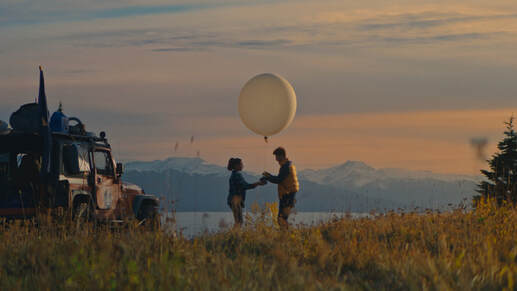 Page Tudyk Gomez and Kevin Michael Martin as Mia and Lucas in Jack Martin’s BOLT FROM THE BLUE. Page Tudyk Gomez and Kevin Michael Martin as Mia and Lucas in Jack Martin’s BOLT FROM THE BLUE. It is definitely safe to say, that there is an air of doom surrounding our world, and it makes sense as to why. After all, war continues to rage over issues that seem unsolvable and there is unrest in our nations regarding what tomorrow should look like thanks to a generational divide, and of course… there’s a real fear about what the landscape of the planet is going to look like in the next fifty years. For we may well be the first species to discover that our actions and our push to create a busy world and a grand economy, has put the planet in real climate trouble. Through our carbon footprints and the fossil fuels we use and well… there’s a terrifying fight over that too. Since there are some who want to side with the money and the corporations to maintain stock prices, while there are others who simply don’t believe the science and that leaves us wondering what will be and it doesn’t seem good. Because as we combat one another, we are not combatting the problem at hand. But what we often forget during these trying times, is that not all the news is bad. Because all we focus upon and hear about is the worst of the worst, not the people who are rushing toward the danger to save lives, nor do we hear much about the people that are working hard to be the ones to solve our biggest problems. But perhaps we should, for that might change our outlook and energize us to believe in something more, in a better tomorrow, and it just so happens that a brand-new movie that recently screened at the Austin Film Festival, makes a point of offering that hope. By giving us a story that features the plight of someone trying to do more than sit back and wait for endless debate to solve the problem, and that makes Bolt from the Blue quite the important film. One that introduces us to an overworked engineer named Mia who is desperate to make her mark on the engineering world and eager to perhaps solve some of mankind’s problems. But the structure of her company, and its misogyny, keeps her working overtime to accomplish nothing. Which is why she is more than happy to take an assignment to check out something unique in Alaska. For a man named Lucas Fletcher has posed to her company, the possibility of capturing and harnessing the power of lightning. An idea so refreshing that she is tasked with stealing it if indeed it works. But her arrival in the wilderness of Alaska, and her time with Lucas changes her outlook on her life and her career. For Lucas carries within him a powerful energy, the kind that speaks to a man willing to sacrifice everything in the name of science and the greater good, and she’s ready to listen to his ideas and feed off of his energy to see if by chance… he’s onto something that will indeed change the world. 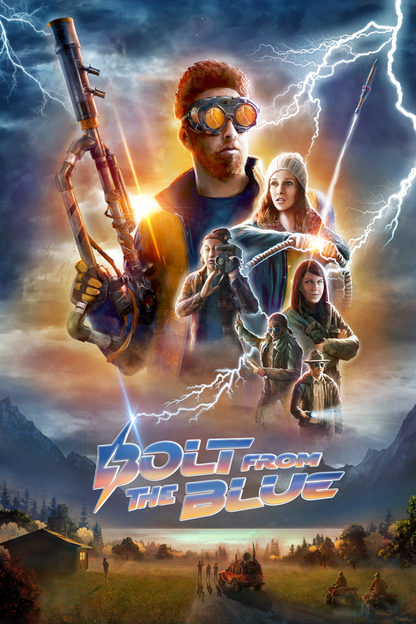 Which is a plot that really does ponder upon the wonder of ingenuity and of the unsung heroes that are out there right now, trying to enact change. For in many ways, Lucas represents the good people who invented the new trash collection systems that are being deployed in our oceans, or the person that is working day and night to find a renewable source of energy and that really does remind us… that not all is lost. Because of the fact that people like Lucas exist and are fighting tooth and nail for their cause and the breakthrough they want to desperately find. Which brings about, an uplifting story to say the least. One that prompts you to root for Lucas and Mia as they fight back against those who tear them down and offer them doubt, and that is a wondrous element to find a story that touches upon climate change, and the wonder of this movie doesn’t end there. Because this is also a movie that works hard to speak to our very soul. In the respect that this is a film that outright tasks us… to be more like Lucas. To reject the dogma of doubt and of doubters and chase a dream, and grab hold of it tightly. Because the film poses the idea, that part of the problem in our world, and why we are so stagnant, is that we are no longer a world of dreamers. We’ve fallen into routine and comfort and stick with status quo because of the strange roadblocks we’ve put up, regarding ingenuity. But if we reject that, and chase the impossible… our spirits will soar, our minds will open up and the possibilities… will be endless. Which only adds to the majesty of this film, one that really does leave you feeling better about your day, about tomorrow and your own desires and wants in this world when it has come to a close. Thanks to a unique and brilliant script from writer/director Jack Martin. Who rejects much of the convention that a story like this would normally feature to really hammer home that our biggest obstacles in this life are doubt and the noise that others create. And well, while some will undoubtedly say that is too saccharine a plot and too fluffy a message, they’re wrong. For it is in fact, the right plot, and the right message, at the right time, one that gives us hope when we desperately need it. Which truly does make this an important watch, for this is that rare film that not only asks us to go for it but reminds us that the world isn’t all bad and we need to look to the good during these trying times. Because that is what will help us process the bad and call us to action, to use ingenuity and hope to change the world for the better and keep the wonder of the human condition alive for ages on end. Written by John Edward Betancourt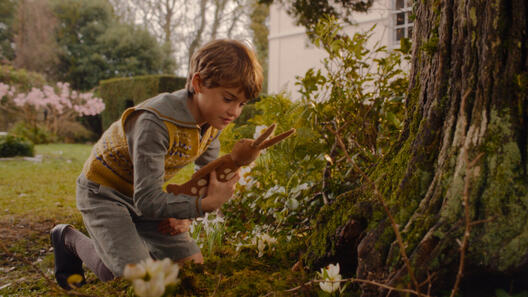 Phoenix Laroche and the Voice of Alex Lawther as William and The Velveteen Rabbit in ‘The Velveteen Rabbit’. (Photo Courtesy of Apple.) Phoenix Laroche and the Voice of Alex Lawther as William and The Velveteen Rabbit in ‘The Velveteen Rabbit’. (Photo Courtesy of Apple.)
If there is one particular debate that comes up often amongst fans of stories, it would have to be… what makes a story truly timeless? Because what’s timeless to one person, isn’t timeless to another, and those conflicting criteria lead to the debate in question. One that is endless in nature, when it doesn’t need to be. Because believe it or not, there are simple elements to storytelling that allow for a book, movie, or short story, to live on forever. For instance… the story in question… must somehow resonate with people on a fundamental level, so that we all share in an emotional connection with said story.
Not to mention, it has to be a story that can fit in any era via messages that truly reflect the human condition and not the zeitgeist of an era. And if a story’s framework can achieve those two simple goals, it will indeed be timeless, and passed down from generation to generation. For its concepts will always find a way to connect with us and teach us lessons that fit the moment because it understands us. If anything, the lasting power of stories is top of mind today, simply because Apple TV+ has helped to give life to a powerful new adaptation of a classic and timeless story. For a fresh iteration of The Velveteen Rabbit is now on the network, and it is hands down, is the finest adaptation of the story to date, one that will ensure this story lives on for ages. Which is saying something, since the story of young William and his Velveteen Rabbit that is eager to find life and root, has been around for a century now, and so many creative minds have put their particular spin upon it and those timeless elements that we find meaning and power within. And while this iteration of the story does feature some of that, since some of those concepts are that important to revisit… it also explores new concepts that are timely and important for young minds to ponder upon and for modern adults to revisit. To offer proper reflection and learning. But before we dive too deeply into those, let’s talk a bit about how this particular movie does indeed freshen up the story’s long-standing musings on the power of acceptance. 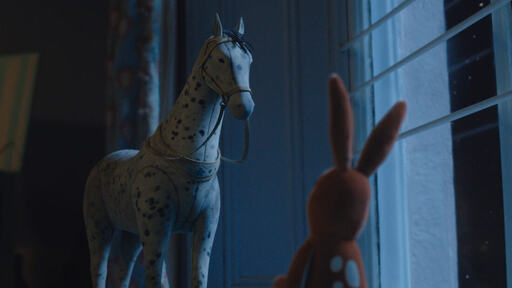 The Voices of Helena Bonham-Carter and Alex Lawther as Wise Horse and The Velveteen Rabbit in ‘The Velveteen Rabbit’. (Photo Courtesy of Apple.) The Voices of Helena Bonham-Carter and Alex Lawther as Wise Horse and The Velveteen Rabbit in ‘The Velveteen Rabbit’. (Photo Courtesy of Apple.)
For this particular story now uses both William and the Rabbit to ponder upon such matters. Giving rise to two sequences that adults and kids can easily relate to. Since William is indeed a bit of an outcast in this story because he moves to a new town and knows, no one, and that’s something kids have encountered and will encounter, when they move towns or perhaps start a new chapter in their schooling. And the Rabbit has to make new friends as well, in a sequence that can easily be compared to starting a new job for an adult, complete with the pretentious ‘club’ nature that the workplace sometimes harbors in this modern world. All of which maintains the core timeless nature of this story.
But once we get past the familiar stuff, does this film really shine. Because soon… it begins to explore some amazing concepts. Such as the power of unconditional love, and the importance of sacrifice when it comes to love and what that can accomplish for people in need. Plus, this is that rare story that bothers to point out that life evolves, and changes quicker than we’d like, but there’s little we can do about it. And that means we will sometimes see important people that mean the world to us, disappear from our lives because they were there for a season to teach us something valuable. Which is a very timely topic since the world is trying to better understand the dynamics of every relationship, we take part in. All of which adds incredible depth to a true timeless classic and once again, makes this story timeless for another generation. All by revisiting what we know and by exploring concepts that we are just now beginning to ponder upon. But what matters most, is that this story provides us with a beautiful and moving experience that celebrates life, and all of its ups and downs, and it gives parents a chance to pass on this story to their kids and have incredible conversations about what they’ve just seen and help them process the power and the gravity, of a timeless story. One that captures the essence of our humanity and reminds us that we are beautiful works in progress, always chasing perfection and always hoping we will achieve it. Watch ‘The Velveteen Rabbit’
Written by John Edward Betancourt 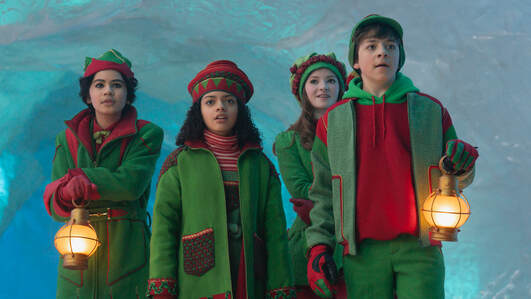 Deric Mccabe, Camila Rodriguez, Madilyn Kellam and Winslow Fegley as Jon Anthony, Dulce, Laurel, and Andy, in Disney’s ‘The Naughty Nine’. (Photo Courtesy of Jonathan Wenk/Disney.) Deric Mccabe, Camila Rodriguez, Madilyn Kellam and Winslow Fegley as Jon Anthony, Dulce, Laurel, and Andy, in Disney’s ‘The Naughty Nine’. (Photo Courtesy of Jonathan Wenk/Disney.) One thing that every fan of holiday films can agree upon, is that holiday films are sacred in nature. In the sense that if it isn’t an independent horror story, there should be minimal darkness in those films. They should instead be about love and redemption, and the power of the season and if there is darkness, that should be used to propel the story to something positive. To really remind us of the majesty of the season and its wonder, and truly, that edict has served this type of film well for decades on end. For that is what we see year in and year out, and we do of course find joy in it, since positive stories are indeed a wondrous break from the sometimes chaos of the world. But we live in a unique time for storytelling, where there’s an opportunity for creatives to try new things and push the envelope when it comes to every type of film out there. Which is giving rise to holiday stories that now ask… can they go deeper? Can they toy with concepts that traditionally aren’t acceptable? Such as say having characters that aren’t focused on the wonder of the season and believe more in their own agenda? And of course… do all this while still celebrating the best elements of these types of films? Well as it turns out, Disney is one the studios that is curious as to what the holiday film might look like if by chance… the core tenants were toyed with and new ideas were explored and a film in that vein is about to make its debut on Disney Channel later tonight, and that makes The Naughty Nine quite the fascinating feature. Simply because… it answers those questions with a resounding yes, through the film’s unique plot. One that introduces us to a boy named Andy… who is smart, surrounded by friends, and a loving family, and absolutely beats to the tune of his own drum. Because Andy gets what he wants in this life and just before winter break, Andy makes sure to take part in a specially designed heist against his school to help him make enough money to buy accessories for the game console he’s expecting Santa to deliver. But when that console doesn’t arrive because Andy discovers he made the Naughty List, he decides to go the extra mile to get what he wants. By recruiting the most talented kids off of the Naughty List, and his sister, so they can head to the North Pole and steal the presents they deserve. 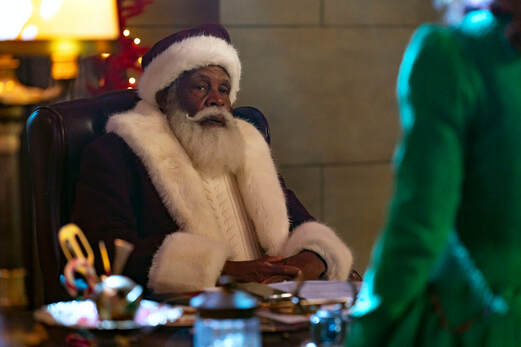 Danny Glover as Santa Claus in Disney’s ‘The Naughty Nine’. (Photo Courtesy of Jonathan Wenk/Disney.) Danny Glover as Santa Claus in Disney’s ‘The Naughty Nine’. (Photo Courtesy of Jonathan Wenk/Disney.) Which is a plot that really is off the beaten path when it comes to holiday films. After all, we rarely see anyone embrace the concept of being on the Naughty List in these tales, not to mention… we don’t see anyone ever give so little care to the meaning of that list… that they feel the need to just rob Santa. But this is a concept that works well for several reasons. In part, because it leads to a big adventure, one that is fun and lighthearted and quite frankly, features some stunning visuals and memorable moments. Giving rise to the reality that if by chance the character isn’t grounded in pure evil and is perhaps misguided… such a plot can work and provide viewers with something different. But of course, there are other reasons why this particular film is so appealing and that relates to the messaging present within it. Because while this holiday film does indeed feature a unique and refreshing core concept, it is at heart… a holiday film. One that takes the time to explore more than just how entertaining it would be to see people assemble a heist again Old Saint Nick. For it does examine, what is it that drives Andy to act in this manner, and those consequences, and of course… it ponders deeply upon how people grow and make better choices than the ones we see here. Giving rise to a highly intelligent film as well that uses subtle commentary and gentle moments to teach us a solid holiday lesson, rather than just making it known loudly as so many other holiday films do. Giving rise to a delightful feature that still does the genre proud by offering great lessons regarding what it means to be better and what we really should cherish during the season. If anything, all of these elements bring forth what could be considered, a flawless hybrid holiday film. One that injects a little everyday Hollywood into the genre by way of that Ocean’s Eleven feel but makes sure to never let go of what makes the holiday feature so beloved and so great. Which is a testament to Director Alberto Belli’s work, since he is the one responsible for blending all these concepts and big moments together, and he brought out the best in the cast as well, who all turn in amazing performances and sell the wonder of the dynamic holiday feature. One that is essential viewing for certain, because you can never go wrong with a holiday film that breaks new ground while still offering up everything, we love about this tried-and-true genre about a magical time of year. ‘The Naughty Nine’ makes its debut on the Disney Channel, at 8 p.m. EST tonight, and will be streaming on Disney+ on Thanksgiving Day. Written by John Edward Betancourt 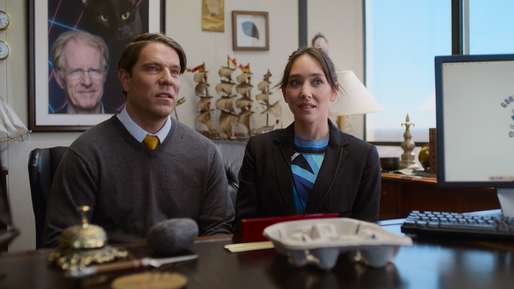 Kiel Kennedy and Patty Guggenheim as Larry and Susan in DON’T TELL LARRY. Kiel Kennedy and Patty Guggenheim as Larry and Susan in DON’T TELL LARRY. It is definitely safe to say that comedy film features have undergone quite the transformation over the past few years. For they are… more endearing than they used to be. In that, they tend to feature a detailed plot now. The kind that harbors a deeper message and some lessons, and they also tend to be a little more grounded in reality than we’ve seen in the past. Which isn’t a terrible thing by any means, since stories evolve and go with the times, and right now… that is what people want. But it is something of an outright shock to people that grew up on comedies that were so vastly different in design and structure. In fact, it wasn’t that long ago that comedies were quite wild and worked hard to really offer up some crazy laughter, and if you go further back, they were experimental and bold. Simply because there was a desire to see how far the humor envelope could be pushed. If anything, the dynamic shift in how comedies are made does beg quite the unique question. In that, is it possible in this day and age of kinder, gentler, comedies, to offer up something bold and experimental and in some cases crude? Well as it turns out, there are indeed some creatives eager to that answer that question with a resounding yes, and it just so happens that a dark and bold comedy of note, recently screened at the Austin Film Festival, and Don’t Tell Larry does indeed showcase how there is still room for this kind of comedy. A feat it accomplishes courtesy of its unique plot. One that introduces us to a hyper ambitious woman named Susan who is on the cusp of having everything she wants. For she is days away from her boss’ retirement and Bruce has made it clear, she’s next in line to take over as CEO of the company. But the arrival of a very weird man named Larry, puts her world into pure chaos. For Bruce reveals that Larry is in fact his long-lost son, and he plans to hand the company over to his baby boy instead of Susan. Which prompts Susan to try and turn Larry against his dad, with disastrous results. For Bruce dies under odd circumstances and soon, other horrible occurrences pop up around the office. Leaving Susan to wonder if she has in fact, unleashed a monster, and now it will be up to Susan and her good friend Patrick to determine if Larry is indeed a stone-cold killer and if so… how to stop him. 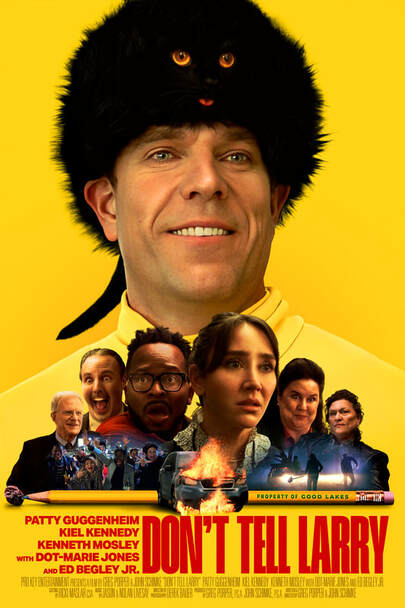 Which is a plot that really is old school in every sense of the phrase. For it is bleak, angry, and filled to the brim with nasty acts from people that have agendas galore, and it is handled with the twisted humor we found in these types of features back in the day, and it works. For several reasons. In large part, because the story understands what it wants to accomplish. It wants to be that throwback; it wants to push the envelope and being honest in that manner means there’s no gimmicks to be found here. Just raw and twisted comedy, the kind that features some outlandish and delightful jokes… that work. Because every joke, every gag fits the situation perfectly and they produce laughs that are hearty in all the right ways, giving rise to a delightfully demented black comedy that is genuinely enjoyable. Yet, there are more reasons as to why this film works so well, and that also lies within the script. For the film’s writers and directors, Greg Porper and John Schimke have in essence blended together what makes comedies work now with the bold nature of what they used to be. Courtesy of characters that are indeed sour in nature and self-serving. Making what we watch cathartic in nature since bad things surround what some could consider to be, bad people. Giving rise to a real sense of karma for these characters and that’s something we all want for the bad people of the world now, that sense of universal justice for their disposition, and when you take that and combine it with elements/commentary regarding the modern corporate work structure, you’re given an inadvertently deeper film than expected, one that resonates in all the right ways. But that’s the beauty of this feature. In that, one doesn’t have to think too deeply about the commentary to enjoy it. Because the jokes still work regardless, and the twisted and fun nature of the film doesn’t depend upon it to tell its story. But what matters most, is that this movie really is the old-school throwback that some crave, and perhaps this movie will serve a bold new look at the future. Plus, it doesn’t hurt that this movie is filled to the brim with acting and comedy legends. Since you’ll find Ed Begley Jr. here as Bruce, and even Dot-Marie Jones and Tina Parker pop up in some impactful and amazing roles. And they are all complimented nicely by the lead trio, consisting of Patty Guggenheim (Susan), Kenneth Mosley (Patrick), and Kiel Kennedy (Larry). Which makes this, a perfect comedy when all is said and done, one that really is quite the delight and a reminder that comedy doesn’t have to follow a structure or a formula, it just has to at its core… find a way to be uniquely funny. Written by John Edward Betancourt 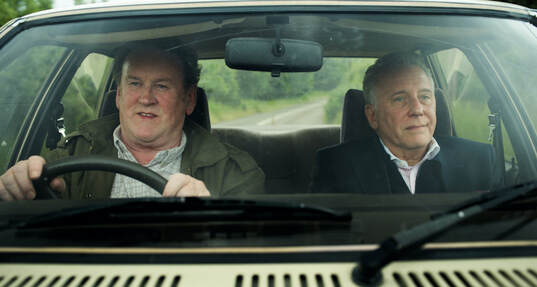 Colm Meaney and Paul Reiser as Ciáran Gorman and Barry Gorman in THE PROBLEM WITH PEOPLE. Colm Meaney and Paul Reiser as Ciáran Gorman and Barry Gorman in THE PROBLEM WITH PEOPLE. If there is one thing, we can all agree upon right now, it is that the world is a very divided place. After all, there are countries fighting at this very moment, and they’re battling over territories in the name of ego and legacy and because they believe one side’s view is the only correct one. Not to mention, here in the United States, there are few who are united. For politically, so many have retreated behind party lines, and generationally speaking, the old guard refuses to let the new guard take over and guide the future of the country based upon the belief that outdated ideologies should win the day. If anything, it’s just safe to say the world is a mess and there appears to be no relief or end in sight. Which does beg some important questions, the kind that we have asked for ages on end. In that, how have we reached this particular point of divide and what would it take to stop it? Because we’re all so, very, very tired of the fighting, and we’re all ready to see the world move forward in some manner. Yet we continue to be stuck and continue to battle it out over silly things. But slowly and surely, we are indeed garnering some understanding of how we move forward and how perhaps we find peace and as is often the case, storytelling is leading the way. Because stories are the safe place where bold ideas can be conjectured and where obvious and simple paths can be forged, and recently a film that features that kind of logic and some solid ideas on how we stop the nonsense and unify, screened at the Austin Film Festival, and that makes The Problem with People, quite the important motion picture. One that offers up observations and lessons through a supremely beautiful and comedic story. One that plunges us into the midst of a unique moment for the Gorman family in Ireland. For Ciáran’s father believes the end of his life is near, and his dying wish, is that he wants his son’s help in fixing a longstanding feud within the family. For long ago, two Gorman brothers parted ways in a sour manner. Giving rise to two family lines and regret. Regret that there was no unity, and no reconciliation, and now, the hope is that Ciáran can entice Barry Gorman to swing by Ireland to repair the damage and forge a new path. A request that does bring forth great joy when Barry agrees. But when Ciáran’s dad decides that a bold move is in order to properly heal the family line, one that will impact Ciáran’s livelihood… things quickly change and the feud… finds new life for a new generation. Leaving these distant cousins to wonder, can there be peace within the family line? 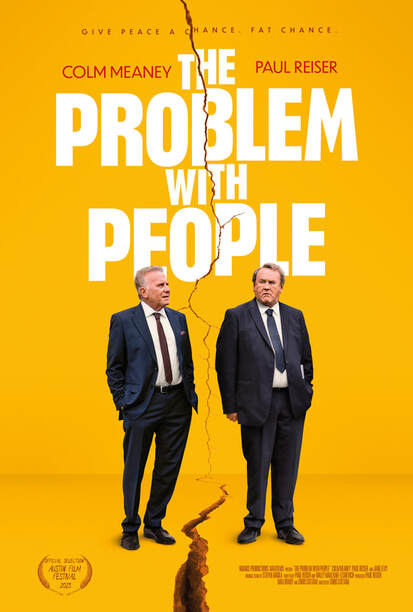 Which at first glance is a plot that seemingly looks less at how we heal our ailing world and instead provides us with hard observations on the problem at hand. But truly, we need to see the problem up close and person to understand it, and the genesis of this new chapter in the feud, does just that, and allows for the core mission of this film to come to fruition. Because it allows for us to understand that too much of what we fight over, is grounded in simple and stupid stuff. Stuff that quite frankly, we could overcome if we put ego to the wayside for just a moment and listened to one another, and actually used our words to communicate in an honest manner. Giving rise to a powerful story about how much time we’ve wasted as a species worrying about who is right, who is wrong and who is superior and that does indeed lead to some fine musings on how this happens, and how we fix it. But of course, there was mention of the fact that this is a comedic romp in nature, and it is important to spotlight that as well. Because that allows for the important lessons at hand to never be overwhelming or too powerful, and it also allows for a unique and human story to take place. One that explores the folly of our actions, and the wonder of who we are as a species. Allowing for hope to come into this tale, and for us to really look at some of our actions with a hilarious objectivity. The kind that definitely gives one pause and further hammers home the lessons in question. Because a lot of the funnier stuff here reflects how we do act, and how ridiculous we can be at times, and that is something worth lampooning. But above all, the comedy just works here, and the jokes are funny, and you will laugh aloud and that is often made possible by way of the cast. For this is a film that stars Paul Reiser (Barry), Colm Meaney (Ciáran), and Jane Levy (Natalya), and they are all masters of their craft and masters of comedy as well. And their work here really sells the wonder of the joke and the wonder of the moment. All of which brings forth, a beautiful and poignant film. One that really explores in great detail how easily we could step away from our sour nature and embrace our better angels but is honest in telling us… how hard that will be…. because we’ve never really tried. But if we did, if we genuinely did, wonders would indeed be accomplished, and at long last… we could see the world in a whole new light and find a unique understanding of our place in the universe, all while sharing a pint with the beautiful people that surround us. |
Archives
March 2025
|
|
© 2012-2025, Nerds That Geek LLC.
All Rights Reserved. |
uWeb Hosting by FatCow


 RSS Feed
RSS Feed